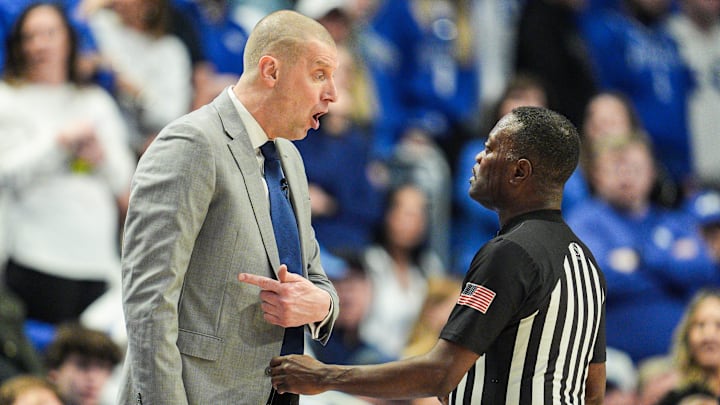It's not easy to be a good referee
Let’s be fair from the jump: officiating is a tough gig. Referees are tasked with watching ten elite athletes moving at lightning speed from every angle, all while fans, coaches, and players scream at them. You're going to miss calls. You're going to overreact sometimes. That's part of the job.
But when officiating stops being the occasional human mistake and starts becoming a weekly storyline, that's when we have a problem. And in 2025, no two leagues have made officiating more of a controversy than SEC men’s basketball and the WNBA.

So, which league truly takes the crown for the worst referees in the game? Let’s break it down.
The case against SEC officiating
There’s physical basketball, and then there’s the SEC.

Associate commissioner of basketball Garth Glissman was responding to criticism when he said, “More fouls were called in SEC Conference games (36.9 per game) and FTs attempted (43.7) than any other power conference this season". Not sure if that is a thing to brag about considering nearly everyone from Jay Bilas to Jay Williams are talking about how it will hurt their tournament chances. Just look at a few examples from 2024–25:
- Alabama vs. Texas A&M: 58 personal fouls. 88 free throw attempts. Nearly three hours of gameplay.
- Georgia vs. Arkansas: 49 fouls. 63 free throws. Game length: 2 hours, 34 minutes.
- Kentucky vs. Texas A&M: 56 combined free throws, 44 combined fouls. Two technical fouls, including one on UK’s Jaxson Robinson for clapping.
SEC games this season are averaging 2 hours, 23 minutes, the longest among major conferences. Laregely in part to reviews and just foul fests in the second half of games.

And remember that infamous moment when a ref followed Mark Pope down the sideline (video at the bottom) like a WWE rival waiting to pounce? That was less about game control and more about personal ego.
The SEC problem isn’t just about volume — it’s about inconsistency and an overemphasis on control. Coaches and players can’t find rhythm when refs inject themselves into every possession.
The Case against WNBA officiating
The WNBA’s referee problem stems from a different source: inexperience and inconsistency.
With a high turnover rate — largely due to officials jumping to the NBA per the NY Times — the WNBA often features less seasoned referees. The Athletic recently noted that women’s basketball lacks a unified development pipeline for officials, meaning there's no consistent grooming system like in men’s D-League or G-League basketball.

The result? Games are often subject to wildly different officiating styles, making it hard for players to know what to expect.
Exhibit A: Caitlin Clark getting called for an offensive foul when a defender slipped (video at the bottom). No push, no contact — just a star player penalized for someone else’s misstep.
While game durations are shorter than the SEC’s marathon slogs, the WNBA suffers from a credibility problem: fans often leave games questioning whether refs understand how to manage high-level competition.
So, which league has the worst referees?
It’s a close call — pun intended.
The SEC has the highest quantity of referee interference: more fouls, more reviews, and longer games.
The WNBA suffers more from quality control: younger crews, no training consistency, and wild week-to-week variation.
If we’re grading on who disrupts the game more visibly, the SEC wins — or loses — this battle. When every drive to the hoop turns into a whistle, and every clap becomes a technical, fans aren’t watching basketball. They’re watching a referee show. And then the missed calls when there should be a foul, just demoralizing.
But don’t let the WNBA off the hook. Until it builds a developmental pipeline and ensures consistent rule enforcement across games, officiating will continue to hinder the league’s growth.
Your Turn: Who’s Worse?
Below are some videos of some of the worst calls from both leagues. From Caitlin Clark’s ghost foul to Mark Pope’s sideline stalker — the evidence is all there.
Reason #6468983360446 the WNBA is unwatchable…..pic.twitter.com/nL2qA91E63
— Spitfire (@DogRightGirl) May 25, 2025
Spot the foul challenge:
— Krysta (@Krysta____) October 21, 2024
The fact that they reviewed it and didn’t reverse the call makes it so much worse-@CathyEngelbert fire your officiating staff dead ass cause they are astronomically atrocious‼️‼️‼️‼️#WNBAFinals | #WNBA | #Lynx pic.twitter.com/DtgnnNSUKx
🚨🚨🔥To wnba fans , please note this was not called as a foul much less a landing space/flagrant foul . Do you think it’s time to fine referees for these type of actions? @WNBA these type of plays can easily lead to injuries.🔥🔥🔥🔥
— Michael (@mikeaalen112735) May 22, 2025
WHERE THE F IS THE FOUL CALL?🔥🔥🔥 pic.twitter.com/qQ9bgEnl3T
This ref just stopped the entire game just to stare down and follow Mark Pope
— Barstool Kentucky (@BarstoolUK) February 23, 2025
I mean wtf 😂😭 pic.twitter.com/Thtl9Am1Xc
Nice shove in the back with no call pic.twitter.com/wg69JP9EJB
— Michael Southern (@msouthern17) April 6, 2025
Let us know: Which league has the worst officials — SEC men’s basketball or the WNBA?
